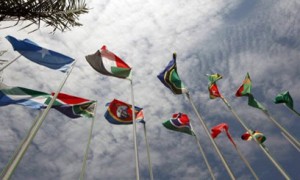
AFP Photo
The Ministry of Foreign Affairs is preparing to sponsor trips to various African nations in an effort to “explain the truth of developments that occurred in Egypt recently,” according to a statement.
The ministry, according to its spokesman, Badr Abdel Atty, will dispatch delegations headed by six senior envoys to speak with high ranking officials in a number of African states to detail and explain the roadmap put in place by the constitutional declaration on 3 July.
The list of capitals these delegations will visit, according to the spokesman, will be revealed after appointments are confirmed with the governments in those countries, adding that the ministry was working to set up meetings with heads of state.
The statement issued by the ministry said the initiative would include countries including Ghana, Sierra Leone, Liberia, Nigeria, Angola, Sao Tome and Malawi.
The visits would serve three purposes, according to Abdel Atty. Firstly, there needed to be an effort to explain the “realities on the ground” and that the change of power was a “corrective revolution.”
“The will of the people of Egypt was heard by the armed forces, so the intervention of 3 July was just a response to this call from a vast majority of the Egyptian people,” without which, the spokesman added, Egypt would be on the brink of “possible civil war”.
Secondly, the trips would work to oppose what Abdel Atty called an “unjust decision” by the African Union’s Peace and Security Council to suspend Egypt from the assembly, something that the foreign ministry considered to have been done “without clarification or facts from the ground.”
“We are committed to building a real democracy based on the roadmap and timetable that was referred by the constitutional declaration,” he added. “This real democracy that we are striving for will be based on respecting human rights where all Egyptians are equal before the law.”
Last Friday, two days after Mohamed Morsi was removed from power, the AU suspended Egypt from all activities, expressing “deep concern at the risks the prevailing situation poses for the long term stability of Egypt and cohesion of its people with far-reaching national and regional consequences,” adding that the change in power was the “definition of an unconstitutional change of government.”
The Chairperson of the AU Commission Nkosazana Dlamini-Zuma said the panel supported a peaceful transition and “restoration of constitutional order”.




